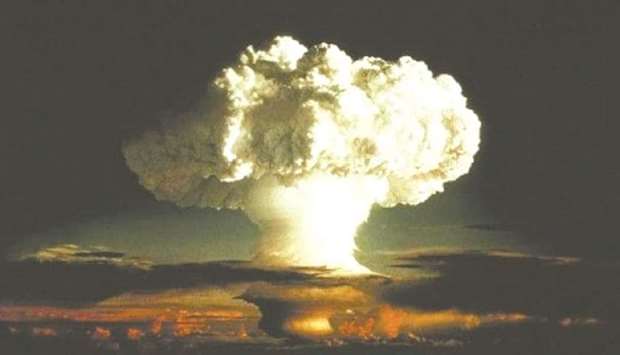Qatar has affirmed its belief that a ‘zone free of nuclear weapons and other weapons of mass destruction and their means of delivery’ represents a regional and practical approach to resolving the problem of the spread of such weapons in a region rife with military conflicts and political crises.
Speaking at the Preparatory Committee for the 2020 Nuclear Non-Proliferation Treaty (NPT) Review Conference, Chairman of the National Committee for the Prohibition of Weapons, Brigadier-General Hassan Saleh al-Nisf, said Qatar considers this approach to be a collective solution to the Iranian nuclear issue, to the use of chemical weapons in the region, and to Israel’s exclusive possession of nuclear weapons in the Middle East.
Al-Nisf referred to Qatar’s endorsement of the statements of the Arab Group and the Non-Aligned Movement on the establishment of a zone free of nuclear weapons and other weapons of mass destruction in the Middle East and to the Arab working paper on the same subject.
“We have no other chance before 2020, so we would like at the outset to demand that we stop any futile debate over whether review conferences are the right forum to discuss this issue or not,” he said.
“The 1995 Middle East decision was an inseparable part of the deal of the indefinite extension of the Treaty and will remain an essential part of the review process as long as it is not implemented.
“We wish to recall that the conferences of 2000 and 2010 emphasised the importance of the decision and that it will remain in force until its objectives are achieved,” he added.
He suggested instead of repeating the previous positions that obstruct the implementation of the decision “to start a real dialogue on how to implement it”, stressing the readiness of Qatar to fully interact with any serious proposals to break the stalemate in this issue.
The Chairman of the National Committee for the Prohibition of Weapons expressed his astonishment at the promotion of some that the states have become tired of this subject dominance on the review process, stressing that countries that support the efforts to free the Middle East from these weapons are those of the Non-Aligned Movement and the majority of African and Asian countries, and the majority of European countries and some nuclear countries support – at least in theory – this initiative.
Therefore, the way out of the stalemate is to move forward positively towards its implementation and not back down.
He pointed out that the 2010 conference was a shining sign and an important turning point, as a clear mechanism and practical steps were put in place to begin negotiations on the establishment of a zone free of these weapons in the Middle East.
The conference also clarified that the parties to the Treaty are responsible for implementing the resolution and its mechanisms along a particular responsibility on the three depositories of the Treaty and the Secretary-General of the United Nations.
Therefore, if there is a default, it is the responsibility of those who have not fulfilled the obligations and mandates to which they have committed themselves.
He added that the delay in the implementation of the Middle East decision is one of the most important factors that eroded the credibility of the Treaty as a whole and is problematic in a review cycle.
Since the postponement of the 2012 conference, in violation of the text and spirit of the mandate issued in 2010, the Arab countries have tried to break the impasse in the process and presented various proposals and ideas and some of which have been rejected without alternative proposals, noting that the first and second preparatory committee did not make any progress on the subject and did not make a positive discussion of any proposals, and this third preparatory committee has the last opportunity to make effective recommendations to the NPT Review Conference in 2020.
In this regard, he proposed a recommendation to the Review Conference to ‘repeat demand that Israel accedes to the Treaty on the Non-Proliferation of Nuclear Weapons as a non-nuclear-weapon state without conditions, and to subject its nuclear facilities to the comprehensive safeguards system of the International Atomic Energy Agency to invite Israel, Iran and the Arab countries to participate effectively and in good faith at any negotiating conferences organised by the United Nations to establish a treaty for the establishment of a zone free of such weapons’.
He also proposed to call on ‘all states parties to the Treaty, especially the nuclear states, to cease any nuclear co-operation or technological exchange with Israel until it accedes to the Treaty on the Non-Proliferation of Nuclear Weapons and with any state that refuses to participate in the process of negotiations to be initiated in order to create a real incentive among the countries of the region to start a serious process towards the establishment of the zone and request the Secretary-General of the United Nations to brief the review conferences and their preparatory committees on developments in this area’.
Concluding, al-Nisf said Qatar affirms the collective responsibility of all the states and the geographical and political groups to create the appropriate conditions and effective incentives for the implementation of the Middle East decision and all its obligations at the subsequent review conferences, adding “this is our vision and our proposals, and we are ready and exited to hear specific views and proposals from all states parties.”

nuclear
